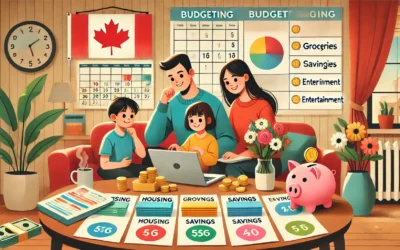Conquering the Loonie’s Squeeze: Your Guide to Personal Finance During Canadian Inflation
Introduction
Canadians are feeling the pinch. Inflation is driving up grocery bills, gas prices, and everyday essentials, leaving many wondering how to make ends meet. But fear not! This blog post equips you with the knowledge and strategies to navigate these financial tides.
Understanding Inflation’s Impact
First things first, let’s get on the same page. Inflation simply means the rise in prices over time. This means your hard-earned dollars buy less today than they did yesterday. While a little inflation is normal, the current rate is causing concern.
Inflation erodes purchasing power, meaning that each unit of currency buys fewer goods and services over time. For example, if the inflation rate is 3%, a basket of goods that cost $100 last year will cost $103 this year. While this might seem minor on a small scale, the cumulative effect can significantly impact long-term financial health, affecting everything from day-to-day expenses to savings and investment returns.
Feeling the Squeeze on Your Wallet?
If you’re worried about inflation’s impact on your finances, you’re not alone. Many Canadians are searching for answers to questions like:
- How will inflation affect my savings goals?
- Can I still afford groceries with these rising prices?
- What adjustments do I need to make to my budget?
The answers to these questions lie in understanding how inflation works and implementing strategies to mitigate its impact.
How Inflation Affects Your Savings Goals
Inflation can erode the value of your savings, meaning that money you set aside today might not have the same purchasing power in the future. This can be particularly concerning for long-term goals like retirement or education savings. For instance, if you are saving for retirement and the inflation rate is higher than the interest rate on your savings account, your purchasing power diminishes over time.
Tips for Protecting Your Savings:
Invest in Inflation-Protected Securities: Consider investing in assets that offer protection against inflation, such as real return bonds (also known as inflation-indexed bonds). These bonds provide returns that are adjusted based on inflation rates.
Diversify Your Portfolio: Diversification can help mitigate risk. Include a mix of stocks, bonds, real estate, and commodities in your investment portfolio to protect against inflation.
Consider Real Assets: Investing in real estate or commodities like gold can offer protection against inflation as these assets typically increase in value when inflation rises.
Review Your Investment Strategy: Work with a financial advisor to ensure your investment strategy is aligned with your long-term goals and adjusted for inflation risks.
Can You Still Afford Groceries with Rising Prices?
Grocery prices are often one of the first indicators of inflation that consumers notice. Rising food costs can strain your budget, especially if you are already living paycheck to paycheck. However, there are strategies you can employ to manage these costs effectively.
Tips for Managing Grocery Costs:
Create a Meal Plan: Planning meals in advance helps you buy only what you need, reducing waste and avoiding impulse purchases.
Buy in Bulk: Items like rice, pasta, and canned goods often cost less per unit when bought in bulk. Ensure you have proper storage to avoid spoilage.
Use Coupons and Loyalty Programs: Take advantage of coupons, discounts, and grocery store loyalty programs to save money on your purchases.
Shop Seasonal and Local: Seasonal produce is often cheaper and fresher. Shopping at local farmers’ markets can also provide cost savings.
Opt for Generic Brands: Generic or store-brand products can be significantly cheaper than name-brand items without compromising on quality.
What Adjustments Do You Need to Make to Your Budget?
Adjusting your budget to account for inflation is essential to maintaining financial stability. Here’s how you can make your budget inflation-proof:
Track Your Spending: Use budgeting apps or spreadsheets to monitor your spending habits. This helps identify areas where you can cut back.
Prioritize Expenses: Distinguish between needs and wants. Focus on essential expenses like housing, utilities, and groceries. Cut back on discretionary spending such as dining out, entertainment, and non-essential shopping.
Increase Your Emergency Fund: Inflation can lead to unexpected expenses. Having a larger emergency fund can provide a financial cushion during tough times.
Re-evaluate Subscriptions: Review your subscriptions and memberships. Cancel those you rarely use or find cheaper alternatives.
Automate Savings: Set up automatic transfers to your savings account. This ensures you consistently save money, regardless of changing inflation rates.
Taking Charge: Strategies for Smart Spending
Don’t let inflation dictate your financial future. Here are some proactive steps you can take:
Review Your Budget Regularly: Continually assess your financial situation and adjust your budget as needed to accommodate rising costs.
Embrace Smart Shopping: Look for deals, explore discount stores, and consider generic brands.
Prioritize Needs Over Wants: Distinguish between essential expenses and discretionary spending. Focus on fulfilling needs first.
Explore Debt Repayment Options: High-interest debt can cripple your finances during inflation. Look into consolidation or lower-interest options.
Invest Wisely: During inflationary periods, certain investments like real estate, commodities, and inflation-indexed bonds can provide better returns.
Explore Debt Repayment Options
High-interest debt can be particularly burdensome during inflationary periods. Here are some strategies to manage your debt effectively:
Consolidate Debt: Consider consolidating high-interest debts into a single loan with a lower interest rate. This can simplify your payments and reduce the amount of interest you pay over time.
Negotiate with Creditors: If you’re struggling to make payments, reach out to your creditors to negotiate lower interest rates or more manageable payment plans.
Use the Debt Avalanche or Snowball Method: The debt avalanche method focuses on paying off debts with the highest interest rates first, while the snowball method targets smaller debts first to build momentum. Choose the method that works best for your situation.
Set Up Automatic Payments: Automating your debt payments ensures you never miss a due date, helping you avoid late fees and additional interest charges.
Stay Informed
Keeping abreast of economic trends and inflation rates is crucial for making informed financial decisions. The Bank of Canada provides regular updates on inflation rates and economic forecasts. By staying informed, you can adjust your financial strategies to align with current economic conditions.
Resources for Staying Informed:
Bank of Canada: The official website of the Bank of Canada offers updates on interest rates, inflation reports, and economic analysis.
Financial News Outlets: Regularly read reputable financial news sources like The Globe and Mail, Financial Post, and CBC News for the latest economic updates.
Financial Advisors: Consulting with a financial advisor can provide personalized advice tailored to your financial situation.
Seek Professional Guidance
If you’re feeling overwhelmed by the financial pressures of inflation, consider consulting a financial advisor. A professional can help you develop a comprehensive financial plan, offer investment advice, and provide strategies to manage debt and expenses effectively.
Conclusion
By understanding inflation and taking proactive steps, you can weather this financial storm and reach your financial goals. Don’t let inflation conquer your finances; conquer it instead! Here’s a recap of the key strategies:
- Understand the impact of inflation: Recognize how inflation affects your savings, investments, and daily expenses.
- Adjust your budget: Track spending, prioritize needs, and cut back on discretionary expenses.
- Shop smartly: Use coupons, buy in bulk, and opt for generic brands.
- Manage debt: Consolidate high-interest debt and explore repayment options.
- Invest wisely: Diversify your portfolio and consider inflation-protected securities.
- Stay informed: Keep up with economic trends and inflation rates.
- Seek professional help: Consult a financial advisor for tailored advice.
By implementing these strategies, you can navigate the challenges of inflation and secure your financial future. Remember, the key is to stay informed, be proactive, and make adjustments as necessary. With the right approach, you can maintain financial stability and achieve your long-term goals despite the pressures of inflation.



